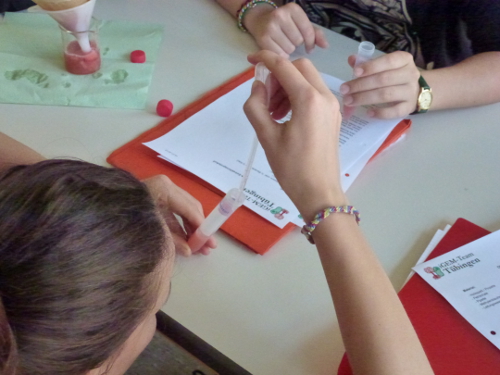Team:Tuebingen/Activities/School
From 2013.igem.org


This march Niedersachsen’s red-green government has abolished genetic engineering lab lessons in some high-schools in Hannover (Leppin, 2013). However, these alarming news are only the tip of the iceberg. There has been a strong anti-genetic engineering front in Europe and in Germany for quite some time now (see for example Whitty et al., 2013). Last year, the opposition led to BASF withdrawing all its biotechnology projects and research from Europe because BASF had to realize that Europe will not offer any markets for GM-crops anytime soon (Freytag, 2012).
Most discussions about genetic engineering are led rather emotionally and many arguments (pro and contra) are based on smattering or even gut feelings. One big problem in biotechnology debates is that red and green genetic engineering are regularly confused due to insufficient knowledge about the various applications of biotechnology. Unfortunately, their blind fear of GM-crops makes people oppose genetic engineering in general.
In order to counter this anti-biotechnology movement we decided to visit two biology lessons of a final year high-school class in the Königin-Olga-Stift Gymnasium in Stuttgart. We planned to tell the students about our iGEM project and to perform a simple DNA extraction experiment in order to demonstrate one of our daily lab-routines.
 At 8:00 am on a beautiful Thursday morning just a few schooldays before summer break we started our lesson with a short recapitulation of some very basic concepts of biology. What is DNA? Why extract DNA? How to find coding regions on DNA? What is the definition of a gene? How to find out the function of a gene? What is genetic engineering?
Then we introduced the students to laboratory methods like restriction digest and to biotechnological tools like restriction endonucleases and their applications in our everyday lab-routine.
At 8:00 am on a beautiful Thursday morning just a few schooldays before summer break we started our lesson with a short recapitulation of some very basic concepts of biology. What is DNA? Why extract DNA? How to find coding regions on DNA? What is the definition of a gene? How to find out the function of a gene? What is genetic engineering?
Then we introduced the students to laboratory methods like restriction digest and to biotechnological tools like restriction endonucleases and their applications in our everyday lab-routine.
 Many students were fascinated to know how working in a laboratory actually looks like. In school you usually never perform restriction digests or ligations thus students have only some theoretical knowledge about biotechnology but cannot imagine how “digesting” or “ligating” some DNA-strands looks like. Therefore, many were flabbergasted when they heard that we basically pipet some clear fluids into a tube and simply give the enzymes some time to work. In the end we put that clear fluid containing tube into the lab-freezer and call it a day. Only very seldomly we see some colorful fluids, however, there are no other impressive effects in today’s molecular biology laboratories.
Many students were fascinated to know how working in a laboratory actually looks like. In school you usually never perform restriction digests or ligations thus students have only some theoretical knowledge about biotechnology but cannot imagine how “digesting” or “ligating” some DNA-strands looks like. Therefore, many were flabbergasted when they heard that we basically pipet some clear fluids into a tube and simply give the enzymes some time to work. In the end we put that clear fluid containing tube into the lab-freezer and call it a day. Only very seldomly we see some colorful fluids, however, there are no other impressive effects in today’s molecular biology laboratories.
 In order to top our lesson off we handed out fresh strawberries, bananas, and kiwi to the students. We had prepared mortars, salt, water, washing-up liquid, filters, tubes, funnels, and alcohol beforehand and while we were monitoring the students perform their first DNA-extraction we tried to explain the function of each reagent.
In order to top our lesson off we handed out fresh strawberries, bananas, and kiwi to the students. We had prepared mortars, salt, water, washing-up liquid, filters, tubes, funnels, and alcohol beforehand and while we were monitoring the students perform their first DNA-extraction we tried to explain the function of each reagent.
We believe that the students really enjoyed our unusual visit and we hope that they will never forget about the very basic concepts of biology we briefly recapped on that beautiful Thursday morning. All in all, we did not want to proselytize but rather inform the students so that they can form a well-founded opinion about genetic engineering.
References
FREYTAG, B. 2012. Frankfurter Allgemeine Zeitung - BASF gibt grüne Gentechnik in Europa auf [Online]. Available: http://www.faz.net/aktuell/wirtschaft/verlagerung-nach-amerika-basf-gibt-gruene-gentechnik-in-europa-auf-11608862.html [Accessed 02.10. 2013].
LEPPIN, J. 2013. Spiegel Online - Niedersachsen: Rot-Grün schließt Gentechnik-Labore in Schulen [Online]. Available: http://www.spiegel.de/schulspiegel/wissen/gentechnik-unterricht-in-niedersachsen-rot-gruen-macht-schullabor-dicht-a-886140.html [Accessed 02.10. 2013].
WHITTY, C. J. M., JONES, M., TOLLERVEY, A. & WHEELER, T. 2013. Biotechnology: Africa and Asia need a rational debate on GM crops. Nature, 497, 31-33.
Back to top
 "
"
